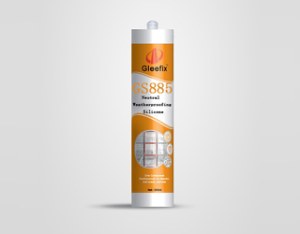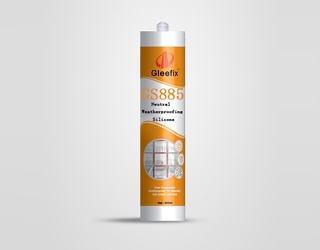Silicone sealant is a part of silicone products. It is mainly divided into deacetic acid type, deic type, deamination type and oxime type. Silicone sealant caulk is also known as glass glue because users buy silicone sealant is mainly used in glass bonding and sealing. The chemical composition of polydimethylsiloxane, silica polymer can all be called silicone. Silicone sealant is a kind of ointment or gel. Once it comes into contact with the moisture in the air, it will solidify into a tough rubber like solid material.
Zhongtian Silicone Sealant Product Series
Silicone sealant product series is a significant part of the whole products series of Zhongtian. It is likely that you have used silicone sealant on your own, or seeing others use is or merely walked by it. Because of the strong adhesive bonds that silicon is able to generate, silicon sealant enjoys quite wide application in various fields. Find silicone window & door sealant as well as a weather-resistant adhesive for neutral curtainwall here in Zhongtian! As silicone sealant suppliers, we provide customers with a reasonable silicone sealant price.
Silicone Window & Door Sealant
One component, neutral, room temperature curing building silicone sealant, and non-corrosive for most of building materials.
Weather-resistant Adhesive For Neutral Curtainwall
GS885 is one component, neutral cure silicone sealant. It curing quickly, high adhesive strength and high modulus.
Silicone Sealant Properties
Silicone sealant is an adhesive in liquid form. Generally speaking, the outlook, touch feeling and function of silicone sealant are much like a gel. It has the following properties:
1. Silicone can keep its elasticity and stability is not only high but low temperatures when compared to other adhesives.
2. Silicone is other chemicals, moisture, and weathering resistance.
3. Silicone sealant must be cured under temperature between 40°F to 100°F and humidity between 5% and 95%.
Silicone Sealant Uses
Compared with other adhesives, silicone sealant has great use-value and strong applicability. It can bond with many materials and show strong tensile properties. During the work, even under great tension and pressure, it will not easily encounter deform. Good resistance to stretching and tearing, play a super protective role. As one of the local China silicone sealant manufacturers, Zhongtian can provide you high-quality silicone sealant application solutions, which can be widely used in new energy, military, medical, aviation, shipping, electronics, automobile, instrument, power supply, high-speed rail, and other industries.
How To Apply Silicone Sealant?
Silicon is often used to finish joints, prevent humidity and fill seams or gaps. You need to apply silicon sealant step by step.
First of all, choose the proper type of silicon sealant. It needs to be noted that not all types of silicone sealants can be painted over. Bonding before you paint over the sealant. Choose the color that is most suitable for the underlying surface. Then the oxidation step takes place. It is worth mentioning that if the silicone sealant used contains any acidic elements, this step will be taken on the underlying surface. And then you need to clean the surface, remove any glue or residues before masking. Using the sealant cartridge then by employing a hobby knife. The next will be making the seal, in which the ideal working position will be holding the sealant gun at an angle of 45°. Last but not least, finishing off the sealant line by wetting your finger with some soapy water. Here you have finished the whole process of applying the silicone sealant.
Using Limited Conditions of Silicone Sealant
Various silicone glass sealant is subject to the following restrictions when used.
-Not suitable for construction in places with long-term water immersion.
-not with the material soluble with oozing grease, plasticizers or solvents.
-frost or wet surface can not be bonded.
-completely closed place can not be cured (silica gel needs to be cured by the moisture in the air).
-the substrate surface is not clean or not firm when not bonded.
Acid silicone glass sealant will corrode or can not bond copper, brass (and other copper alloys), magnesium, zinc, electroplated metal (and other zinc alloys), while it is recommended that masonry materials made of goods and carbonized iron substrate do not use acidic glass adhesive in methyl isobutyrate (PLEXIGLAS), polycarbonate, polypropylene, polyethylene and TEFLON (Teflon, polytetrafluoroethylene) made of The use of this product on the material will not be able to obtain a good bonding effect and good compatibility.
It is also not suitable for joints moving more than 25% of the joint width, and it is better not to use ordinary acidic glass adhesives on structural glass (except acidic structural adhesives), and acidic glass adhesives should not be used in places where abrasion and substantial disadvantages can occur. Silicone acid glue substrate surface temperature of more than 40 ℃ is not suitable for construction.
Categories of Silicone Sealant
By product packaging
Single-component and two-component.
Single-component silicone adhesive, the curing of which is dependent on contact with moisture in the air to produce a change in physical properties.
Two-component means that the silicone adhesive is divided into two groups A and B. Any group alone cannot form a cure, but once the two groups are mixed, they produce a cure.
The common market is a single-component silicone glass adhesive.
By nature
Single-component silicone glass adhesive is divided into two types of acidic and neutral adhesives by nature.
Acidic glass adhesives are mainly used for general bonding between glass and other building materials. The neutral glue overcomes the characteristics of acidic glue corroding metal materials and reacting with alkaline materials, so it has a wider range of application, and its market price is slightly higher than acidic glue.
A special type of glass adhesive in the market is silicone structural sealant, which is directly used for metal and glass structure of glass curtain wall or non-structural bonding assembly, so the quality requirements and product grade is the highest in glass adhesive, and its market price is also the highest.
By color
Silicone glass adhesive has a variety of colors, commonly used colors are black, porcelain white, transparent, silver gray, gray, bronze six kinds. Other colors can be customized according to customer requirements.
Construction Process of Silicone Sealant Caulk
1. The seam should be clean, no debris and water, for tiles with high water absorption rate, the seam can be wetted in advance.
2. Clean the gap to be caulked, so that there is no dust, debris and water accumulation.
3. The depth of the gap should be not less than 0.6㎝ or tile height.
4. The pore of the aperture of the tile is too large, should first make the finish protection before caulking, so as not to affect or pollute the tile surface, or use a special hooking knife for caulking.
5. Mix the colorful waterproof and anti-mildew caulk according to 3.3~3.5: 1 (powder: water) ratio into a paste without particles, leave it for 3~5 minutes and then stir for 1~2 minutes to use.
6. With a rubber caulking knife or soft scraper, mix the colorful waterproof anti-mildew caulk along the diagonal direction of the brick surface pressed into the seam, fill the gap, and scrape away the excess, construction time of 1 ~ 2 hours.
7. After the silicone sealant caulk is completely cured in 24 hours, use water or special cleaning agent to remove the remaining stains.
Cautions of Using Silicone Leak Sealer
1. The ratio of powder and water of caulking agent is slightly different depending on the width of the tile seam and the dryness of the environment, and the seam width should be 1.5~5mm if the seam is narrower (when using coarse sand caulking agent, the width of the tile seam is 2~13mm).
2. You cannot use acidic cleaning agent to clean the caulked tiles.
3. Construction should not be carried out outside 5~40℃ and under rainy condition.
4. Special caulking agent such as neutral adhesive should be used at the expansion joint.
5. Try not to have too thick caulk residue in the construction of the tile surface, so as not to be difficult to clean after bonding.
6. Avoid pressure, scraping and rain on the caulked tiles and caulk within 24 hours.
7. After the construction of black caulk, the base surface should be cleaned with a dry cloth as soon as possible (within 10 minutes). After 24 hours of drying, only then clean the remaining spots with water to avoid whitening of the caulk.
8. When constructing a large area, it is advisable to leave an expansion joint, and it needs to be maintained once in 5-6 hours after construction, and the second time after 24 hours.
9. Silicone leak sealer has a certain corrosive, should avoid contact with the eye, such as inadvertently into, immediately flush with a lot of water, serious cases should be immediately sent to the hospital for medical treatment.
Floor Tiling by Using Silicone Joint Sealant
1.First make the ground surface with water wet, to be no water on surface then begin the binder construction.
2. To confirm the base surface without bright water, scraping special artificial stone adhesive (strip shape / full scraping) thickness of 3mm or more, the same practice on the back of the stone, the thickness of 2-3mm, and then paste the stone.
3. Within the specified time (according to the silicone joint sealant use instructions requirements) paste the stone, lay on the stone, with a wooden mallet gently knock, so that the new paste artificial stone can be completely and adhesive close fit.
4. Correction level and the joints between the neighboring board, (caulking construction) note that the stone should be reserved between 2mm or more joints.
5. Paste the good stone 3 days later (according to the instructions for use of special artificial stone adhesive) before clearing the seam, caulking treatment, closing the seam should use special artificial stone caulking agent.
6. After the caulking treatment clean (can not use acidic and alkaline detergent, it is recommended to use special artificial stone cleaner) attached to the surface of the plate caulking and dirt.
7. Attention: large area paving, should be set at appropriate intervals of 8-10 meters 5-8mm expansion joints.
8. After the stone paving, after acceptance and cleaning before the film torn.
Localisation : No.20 Huayin North Road, High-tech Industrial Park, Quzhou, Zhejiang,China, 324004 No.20 Huayin North Road, High-tech Industrial Park, Quzhou, Zhejiang,China,
Personne à contacter : Cheng Doris, 05708598517









